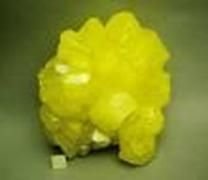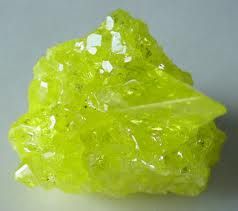
All iLive content is medically reviewed or fact checked to ensure as much factual accuracy as possible.
We have strict sourcing guidelines and only link to reputable media sites, academic research institutions and, whenever possible, medically peer reviewed studies. Note that the numbers in parentheses ([1], [2], etc.) are clickable links to these studies.
If you feel that any of our content is inaccurate, out-of-date, or otherwise questionable, please select it and press Ctrl + Enter.
Why does the body need sulfur?
Medical expert of the article
Last reviewed: 04.07.2025

Sulfur, the sixteenth most abundant element in the universe, has been known since ancient times. Somewhere around 1777, Frenchman Antoine Lavoisier, the founder of modern chemistry, was convinced, unlike the rest of the scientific community, that sulfur was a chemical element. Sulfur is a component of many common minerals, such as galena, gypsum, and others. Why does the human body need sulfur?

What is sulfur?
Sulfur is a naturally occurring mineral found primarily near hot springs and volcanic craters. It has a distinct "rotten egg" odor caused by the smell of sulfur dioxide gas when it comes into contact with oxygen. As a supplement, sulfur comes in two forms: dimethyl sulfoxide (DMSO) and methylsulfonylmethane (MSM). About 15% of DMSO breaks down in the body to methylsulfonylmethane. Both forms of sulfur are good for treating all types of pain.
Sulfur occurs naturally in some plants, such as horsetail, fruits and vegetables, some grains, and milk. Sulfur plays an important role in joint health and helps keep connective tissues, such as cartilage, tendons, and ligaments, healthy. It can also slow down nerve impulses that transmit pain signals, reducing pain.
Industrial sulfur
Sulfur is a by-product of chemical paper production and is used as an industrial solvent and for medical purposes. Sulfur is also used in creams and taken internally for pain. Unlike the first form of sulfur, MSM, the second form, DMSO, is absorbed through the skin.
Never use industrial sulfur as a supplement to medications, as it may contain dangerous impurities. You should talk to your doctor before taking sulfur either internally or externally.
Mud baths with sulfur
Mud baths containing sulfur, often called balneotherapy, can help treat skin conditions and arthritis. Balneotherapy is one of the oldest forms of pain treatment for people with arthritis. The term "balneotherapy" comes from the Latin word and means soaking in thermal or mineral water. Some people claim that these baths are helpful for allergies and respiratory conditions, but there is no scientific evidence to support this.
People also use sulfur products on their skin to treat acne and other skin conditions.
Many - but not all - studies show that there may be a link between sulfur gases released into the environment and worsening allergies and respiratory diseases, particularly asthma.
Skin diseases
Sulfur packs and other types of sulfur compresses are applied to the skin to help treat psoriasis, eczema, dandruff, folliculitis (infected hair follicles), warts, and tinea versicolor, a chronic skin condition characterized by patches of skin that are a different color from the normal skin tone.
Arthritis
Balneotherapy - Well-designed studies, most of them conducted in Israel, show that balneotherapy can help treat various types of arthritis, including osteoarthritis (OA), rheumatoid arthritis (RA), and psoriatic arthritis. People who took sulfur baths and used other treatments experienced less morning stiffness, were better able to walk, and had less inflammation, swelling, and pain in their joints, especially in the neck and back.
Mud therapy and Dead Sea salts dissolved in a regular bath also improved arthritis symptoms, but not as effectively as a Dead Sea holiday.
 [ 1 ]
[ 1 ]
Allergic rhinitis (hay fever)
Studies have shown that 2,600 mg of sulfur per day for 30 days can reduce seasonal allergy symptoms. But more and more research is needed to see if sulfur has any real effect.
Shingles
One form of sulfur, dimethyl sulfoxide, has been suggested as a treatment to reduce pain and inflammation in shingles (herpes zoster). Some evidence suggests that sulfur may actually reduce the amount of damage and inflammation, but more research is needed to understand this for sure.
Interstitial cystitis
Doctors also believe that dimethyl sulfoxide is good for treating interstitial cystitis, a chronic inflammation of the bladder that causes frequent nighttime urination as well as pain. When sulfur in the form of dimethyl sulfoxide is used to treat interstitial cystitis, the doctor injects a liquid solution directly into the bladder.
General anesthesia may be necessary because the procedure can be painful and may cause bladder spasms.
Amyloidosis
Several studies may lead us to believe that sulfur, applied in creams or orally, may help treat amyloidosis, a condition in which protein builds up in organs and damages them. However, since this is rare, there are no scientific studies on the effects of sulfur on amyloidosis. Use sulfur creams only under the supervision of a doctor.
Food sources of sulfur

Sulfur is found in protein-rich foods such as eggs, meat, poultry, fish, and legumes. Other good sources of sulfur include garlic, onions, Brussels sprouts, asparagus, cabbage, and wheat germ.
Below is information about the sulfur content of some products:
| Product | Content, mg/100 g |
|---|---|
| Pork | 220 |
| Beef | 230 |
| Fish - horse mackerel | 210 |
| Fish - sea bass | 210 |
| Fish - cod | 202 |
| Fish - chum salmon | 205 |
| Broiler chickens | 180 |
| Soup chickens | 184 |
| Chicken eggs | 177 |
| Dairy products | 28 |
| Ice cream | 37 |
| Dutch cheese | 25 |
Sulfur for children
There is no data on the effects of sulfur on children's bodies.
Sulfur for adults
There are no recommended doses of sulfur to include in your diet, as most people get all of this mineral they need from their diet.
Arthritis: Studies have shown that oral doses of sulfur for this condition are 500-3000 mg MSM per day, or topical doses of 25% DMSO cream or gel applied 1-3 times per day.
Hay fever: One study used 2600 mg daily for this condition.
Amyloidosis. Oral doses of sulfur for this disease are 7-15 g DMSO per day, or topical doses are 50-100% DMSO, which is applied 2 times a week.
Precautions when taking sulfur
Because of possible side effects and drug interactions, you should only take sulfur supplements under the supervision of a knowledgeable healthcare professional.
Researchers believe that one form of sulfur, MSM, is safe. However, you should talk to your doctor before taking large doses of this or any other drug.
Do not take the sulfur form, DMSO, internally without a doctor's supervision. Side effects from taking DMSO internally include headache, dizziness, drowsiness, nausea and vomiting, diarrhea, or constipation. Used topically, DMSO may cause skin irritation.
If you have diabetes, asthma, or liver, kidney, or heart disease, do not use sulfur in the form of DMSO. Never take sulfur in the form of industrial grade DMSO.
DMSO, a form of sulfur, should not be used by pregnant or breastfeeding women.
Interesting facts about sulfur
Sulfur makes up almost 3% of the Earth's mass. If you think that's not much, next time you look up at the sky and see the Moon, think about this: the Earth contains enough sulfur to contain not one Moon, but two!
Pure sulfur is odorless, but many of its compounds smell really bad! For example, sulfur compounds give skunks a chance to demonstrate their horrible odor. Rotten eggs (and most stink bombs) smell like that because of the odor of hydrogen sulfide, H2S.
There is much more sulfur in the Earth's core than in its crust - about 100 times more.
Penicillin is a natural sulfur-based antibiotic.
Attention!
To simplify the perception of information, this instruction for use of the drug "Why does the body need sulfur?" translated and presented in a special form on the basis of the official instructions for medical use of the drug. Before use read the annotation that came directly to medicines.
Description provided for informational purposes and is not a guide to self-healing. The need for this drug, the purpose of the treatment regimen, methods and dose of the drug is determined solely by the attending physician. Self-medication is dangerous for your health.

